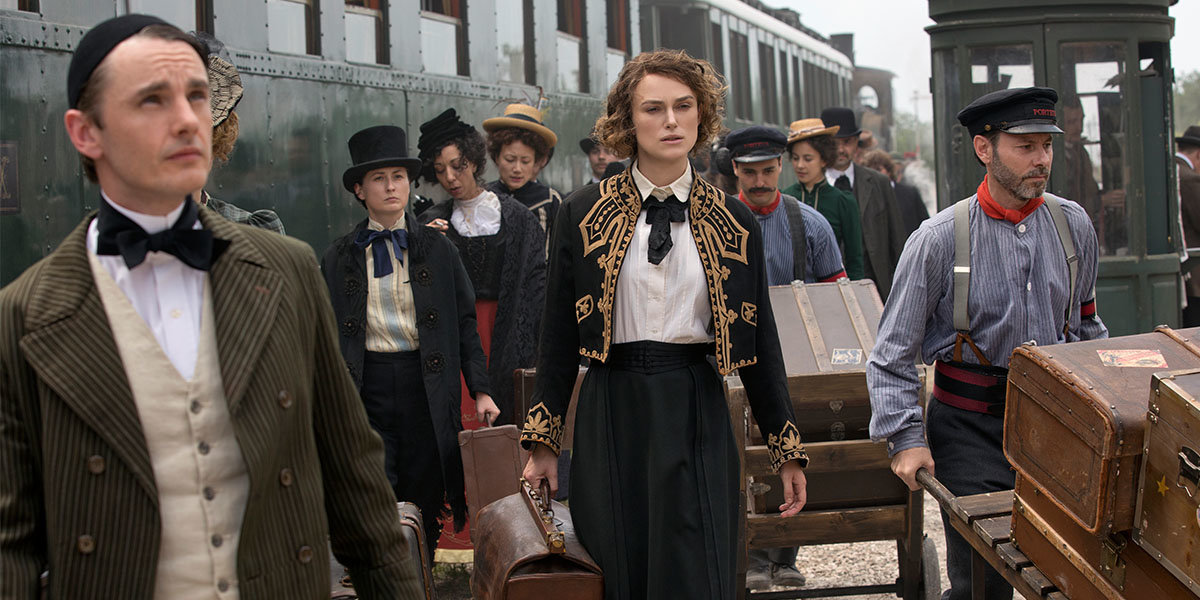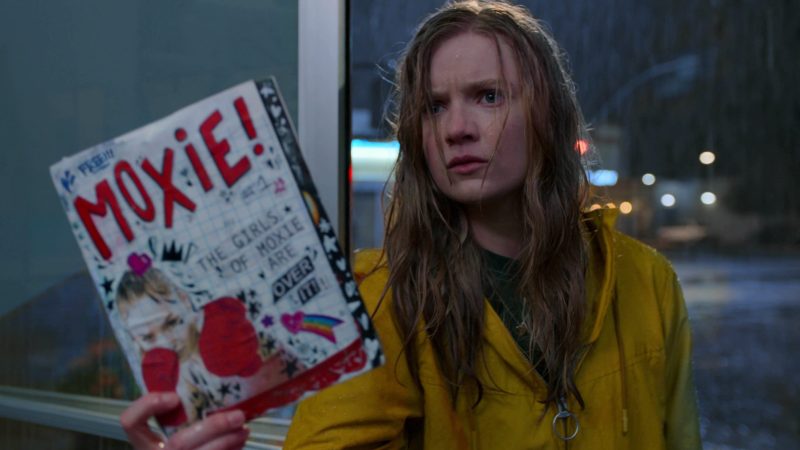Doncha just love movies? Where else can you imagine a man who can’t wait to cheat on his new bride, Keira Knightley? But, of course, if French turn-of-the-century “author” Henry Gauthier-Villars a.k.a. “Willy” weren’t so willy-ing to blow off the honeymoon, perhaps he doesn’t plant the seed that Sidonie-Gabrielle Colette a.k.a. “Willy” as well, strangely enough, is better off not relying on him to make her happy.
It’s 1893 in French farm country and Colette (Knightley) is bored with pastoral life. We’re not going to ask how Mrs. Dursley managed to mother not-so-li’l Colette when she just got axe murdered in Fall River in 1892. Anyhoo, the semi-famous author/scoundrel Willy (Dominic West) often makes house calls because, I dunno, maybe that’s what authors did in 1893. I was a bit taken aback when I discovered Colette was sneaking off to the barn to wrestle with Willy’s willie. Yeah, I know Keira Knightley is now 33; it still looks like a nasty middle-aged dude canoodling with a woman half his age. Adding at least forty pounds of girth to the frame of Dominic West, with dastardly period-appropriate facial hair and a three piece suit, the leading man looks like a villain in Marx Brothers film. I kept wanting Groucho to walk in and steal his cigars.
As I mentioned in the top paragraph, Gottlieb there waits the proper marriage incubation time (about 48 hours) before visiting whores; what is a new husband to do? When not being unfaithful, Willy spends his free time developing expensive tastes and pissing off creditors. You might have noticed by now that in a biopic about a feminist icon, all I’ve done is talk about her husband. Yeah, that’s not a mistake, unfortunately. This film gave an unbelievable amount of screen time to that douche bag, Mr. Colette.
Turns out, somewhere in-between first cheating on his wife and first cheating on his creditors, Willy forgot how to write, so he turned to his wife for help. It went something like, “remember how you like sayin’ stuff? Why don’t you write it down?” I think it’s both important and telling that Willy sought not to retell Colette’s college tales himself, but let Colette invent an alter ego, Claudia. Claudia enjoyed college, like, a lot, knowwhatI’msayin’? Anyway, you know what’s coming – Willy distances himself at first, but when he realizes his deck is empty, he plays his wife’s cards. Willy does edit the manuscript, but the Claudia stories and writing is from Colette … and Douchey McGottlieb has them published solely under the name “Willy.”
I understand the sexual liberation angle the film went for, but half the screenplay devoted itself to Willy’s money issues, which only go so far for me. Past a certain point, the Claudia books are making money hand-over-fist and so are the marketing rights. It would be like imagining Stephenie Meyer going broke right now, which seems damn near impossible. Yet, the money issues kept Dominic West solidly in the film even when Colette was exploring an entire new world of liberation away from that Willy of hers. In turn, this kept Colette the motion picture both tiresome and mis-focused.
This film did turn out mildly better than “Collate,” the biopic about a turn-of-the-century French writer mostly into putting her documents in proper order.
I kinda wanted to love this film if for no other reason than past the first hour or so, almost every new face that showed up was destined to be somebody’s sex partner; isn’t that fun? And, indeed, my favorite moment in the film is when Willy and Colette take turns cheating on one another with the same person. Unfortunately, there is more to entertainment than keeping a scorecard for sexual conquests. So I didn’t love it. That didn’t, however, stop people around me from loving it; of course, those applauding at the end of the film were all distinctly not CIS male and had an average over 70, so … if that’s your crowd, this is your film. I’m not there quite yet.
Speculates for years guessed Shakespeare was a dame
Could such detract from Bill’s Hamlet of fame?
The Sun Also Rises for Ernest each day
Suppose the Old Man was Caludine Hemingway
Was Dickens un-fair with family relations?
Did his spouse Catherine write Great Expectations?
You’ll lose your mind in small part? No, large!
When you find The Iliad was written by Marge
Rated R, 111 Minutes
Director: Wash Westmoreland
Writer: Richard Glatzer & Wash Westmoreland & Rebecca Lenkiewicz
Genre: When you want to tell a feminist tale, but you can’t help reflecting on the man
Type of being most likely to enjoy this film: Feminists desperate for a win; I daresay many of us are these days
Type of being least likely to enjoy this film: Descendants of Henry Gauthier-Villars




